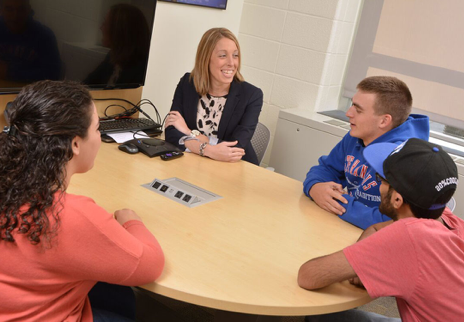Blog Entries
The Intertwining of Burnout and Professionalism in Graduate School
Burnout can be seen at any level during and after your collegiate career, and it can manifest in a variety of ways. As such, it is crucial to know how to best avoid burnout, which can be a tall task. Although it may seem difficult to do, avoiding burnout can become second nature—even during graduate school when you might feel like you hardly have time to sleep, eat, or relax. All it takes is a few gentle reminders to yourself to be considerate of your time, abilities, and the resources you can take advantage of as a graduate student.
The following tips not only assist in avoiding burnout, but they will also help you maintain professionalism in the face of exhaustion.
Ask a seasoned professional to be your mentor.
Having a mentor while in graduate school presents a number of benefits. In regards to burnout, this professional can provide advice as to how they managed their time and stress levels in graduate school. In addition to this advice, they might also have recommendations for professional organizations that you can join. These associations not only help you maintain an awareness of current practices in your field, they also host webinars, conferences, and panels that often provide a space for solidarity in which colleagues can come together to discuss the struggles they face, such as burnout. Events such as these, may provide insight into how professionals across a variety of institutions and ranks avoid burnout themselves. As you continue to engage in these learning experiences, you can develop your own personal understanding of how to work productively and professionally when confronted with feelings of burnout.
Be realistic about the course load you can handle.
While graduate school is a great time to challenge yourself, you also do not want to bite off more than you can chew. You will want to take several factors into consideration when discussing the courses you would like to take each semester with your advisor. Some of these factors include the time you typically spend working and caring for your family. In order to be present and be prepared, as the National Association of Colleges and Employers (NACE 2021) highlights as an example of professionalism, you will want to be sure that you can devote the appropriate amount of time to your courses. If this means taking one or two courses rather than three, that is perfectly fine. It is better to know your time-based limits, rather than seem unprofessional because you are not able to provide quality work. Being able to more diligently work on fewer courses will also allow you to achieve your goals and finish your assignments in a timely manner with fewer mistakes, all of which NACE (2021) lists as aspects of professionalism.
Respectfully voice your concerns about a class’s workload or a specific assignment.
Should you feel that you are overwhelmed by a course, and have already taken tip two into consideration, think about having a conversation with your professor. Many professors will encourage you to have these discussions with them, and will carve out time to do so, throughout the semester prior to course evaluations. It is possible that many other students in your class are feeling the same way and may be having the same discussions. These conversations with your professor(s) may help to determine how the class and your own work can be improved. Therefore, you might be able to prevent burnout and continue to meet the aforementioned aspects of professionalism.
Take time to care for your mental health / self-care.
This tip may seem to be the most obvious, but it also appears to be the least implemented. Self-care plays a huge role in averting burnout. Without taking the time to reenergize, you will be more likely to experience burnout, which may affect your job performance and make you appear unprofessional. If you have a hard time making sure you practice self-care, try to create a self-care plan that will help you hold yourself accountable. Some important pieces to a self-care plan include determining which of your current coping methods are healthy or unhealthy, understanding the impediments to your self-care exercises, and creating an emergency self-care plan for the more distressing situations you may face. Overall, cultivating a self-care plan, and incorporating actions such as those listed above, can help you throughout your time in grad school and beyond.


Follow Career Development Center on Social
CDC on Facebook
Stay up to date with Career Development Center's posts on Facebook.
CDC on Twitter
Interested in Career Development Center's tweets? Follow them on twitter.
CDC on Instagram
See the latest posts on Instagram by Career Development Center.





